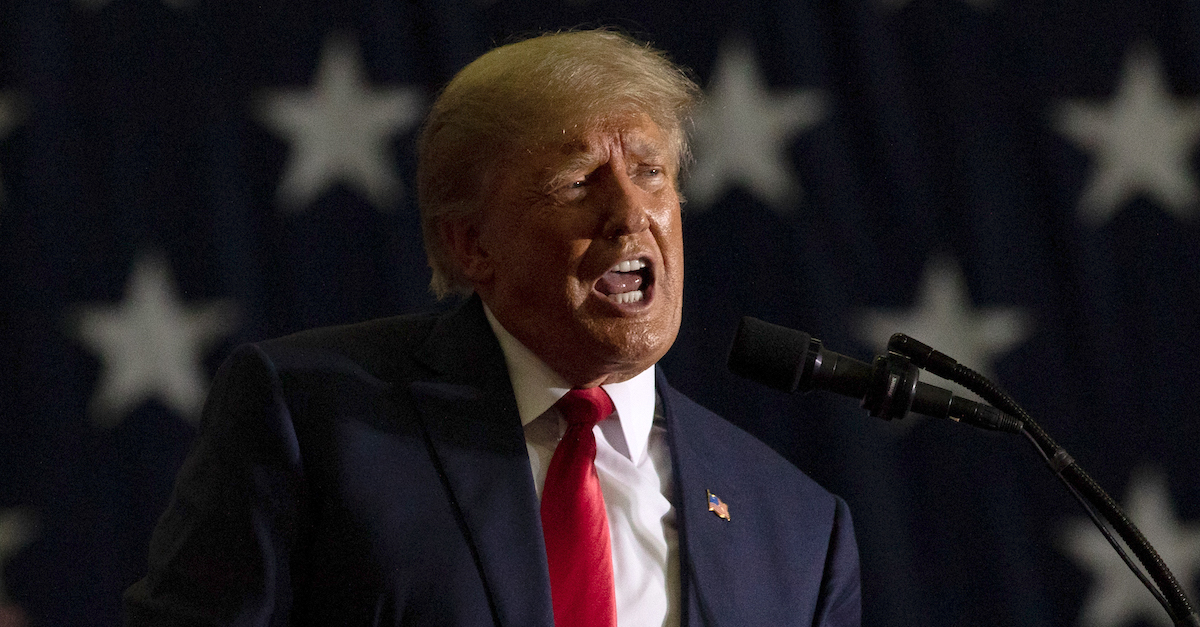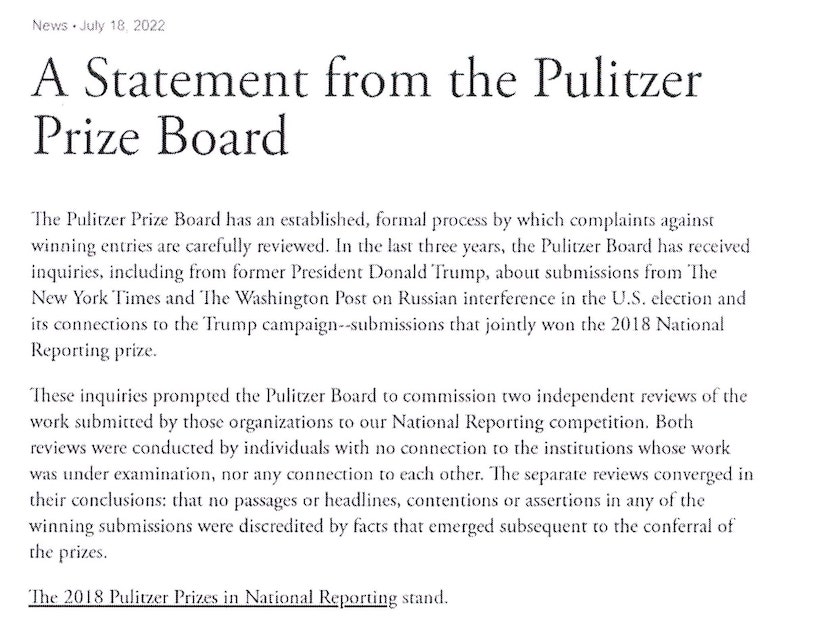
Former President Donald Trump speaks during a Save America rally on Oct. 1, 2022 in Warren, Michigan. (Photo by Emily Elconin/Getty Images)
Former President Donald Trump threatened to sue the Pulitzer Prize’s board, administrator and members for defamation — less for what they wrote, but for the reporting that they lauded during the time of Russia investigation.
“By ratifying the 2018 prizes awarded to The New York Times and The Washington Post, the Board and its individual members are participating in and perpetuating the absurdly false and defamatory narrative contrived by the President’s political opponents: that he and his campaign somehow colluded with Vladimir Putin and the Russian government to gain advantage in the 2016 U.S. presidential election, and thereafter maintained some nefarious connection with Russian elements during the presidential transition and Trump administration (the ‘Russia Collusion Hoax’),” his attorneys R. Quincy Bird and Jeremy D. Bailie wrote.
The former president’s other attorneys John P. Rowley III and John S. Irving had asked the board in July to withdraw the 2018 prizes, and the Pulitzer board refused that request, issuing a statement that no subsequent facts discredited the prizes that they bestowed. The new letter labels that statement of confidence in their judgment as defamatory.

The Pulitzer board’s statement is embedded in Trump’s legal threat.
Trump demanded that the board issue a “full and fair correction, apology, or retraction” within five days, or potentially face a lawsuit against the body and its members.
First Amendment experts scoffed at theory that bestowing honors on news coverage can be defamatory.
“Just cartoonishly vexatious,” expert Ken White, known by the legal nom de plume Popehat, told Law&Crime.
Trump tried, and spectacularly failed, to sue more than two dozen people in a vast racketeering suit. More than dismissing the case, a federal judge roasted the complaint as trying to substitute “length, hyperbole, and the settling of scores and grievances” for legal merit. The former president’s lawyer Alina Habba vowed to appeal, but his legal team is currently staring down sanctions motions in that case.
Special counsel Robert Mueller’s report on Russian interference in the 2016 elections did not find a chargeable criminal conspiracy between the Kremlin and the Trump campaign. Mueller did, however, find that Russia wanted Trump to win the race and the campaign welcomed that help. He also found that Trump’s conduct to stymie the probe repeatedly met every prong of the federal obstruction statute. The special counsel’s office brought charges against 34 people and entities, resulting in eight guilty pleas and a conviction at trial. Numerous Russian-based defendants remain at large, and Mueller’s report found that an associate of Trump’s campaign chair Paul Manafort handed internal polling data to Konstantin Kilimnik, a man identified by a GOP-led Senate committee as a Russian intelligence operative.
Yet time and again, Trump has returned or threatened to return to the courts for a judicial determination that the probe that convicted several of his cronies was, in fact, a massive “hoax.” Each time to date has failed.
Legal experts believe that, if Trump’s lawyers actually file this threatened lawsuit, their latest effort would be no more effective than the others.
“He’s talking about suing people for a subjective evaluation by a prize organization of whether or not they think stories are inaccurate,” White noted. “There is no plausible way that that can be a provably false statement of fact. It is a statement of opinion and analysis and commentary on multiple different levels. The only thing this is about is fundraising, gesturing to the base and being a thug, frankly.”
White added that he would have assumed the former president’s litigation threat against the Pulitzer board was empty, until Trump actually sued CNN for using the phrase “Big Lie” and airing segments comparing him to Adolf Hitler.
As a First Amendment lawyer and advocate, White appraised that lawsuit as “completely frivolous and contemptible,” noting that they are statements of opinion rather than inaccurate factual assertions.
The letter from Trump’s counsel indicates that any lawsuit may be filed in the state of Florida, which has a muscular anti-SLAPP statute. Short for “Strategic Lawsuits Against Public Participation,” anti-SLAPP law punishes lawsuits designed to chill free speech.
Former federal prosecutor Mitchell Epner, who now practices media law as a partner with the firm Rottenberg Lipman Rich PC, said the Sunshine State statute makes sanctions compulsory in certain instances.
“If you file a defamation or similar claim against somebody for speaking on a matter of public interest — and your claim is dismissed on a motion to dismiss or a motion for summary judgment because there are no facts to support it — the court has no discretion: It must award attorneys fees to the winning side as a sanction,” Epner told Law&Crime.
“That’s chargeable, not against the losing attorneys, but against the losing client,” he added.
Even if a court awards sanctions in a hypothetical suit, some legal experts like White believe it won’t deter Trump from filing lawsuits with little legal merit.
“Trump went out fundraising the day after he filed that incredibly abusive defamation suit against CNN, and I have no doubt that he is raising a lot more money than he’s going to be sanctioned for even if you lose it as an anti-SLAPP motion,” White said.
In light of the financial and other incentives, White noted, stronger deterrence than attorneys’ fees is needed.
“If you’ve got a situation where you have unethical attorneys — and you’ve got financial incentives to file meritless lawsuits to drive contributions, and votes and clicks — then you’ve got absolutely nothing standing between people and frivolous lawsuits,” he continued. “And that’s a real problem.”
Epner believes Trump’s emphatic defeat in his RICO case might turn the tide, should sanctions motions abound.
“You get enough of these sanctions, all of a sudden, you actually do have the rarest of animals: a potentially meritorious disbarment situation,” Epner said. “Trump’s recent lawsuit that was filed against CNN seems to me to be a similar press-release-as-a-lawsuit. I fully expect that that will be dismissed and attorneys fees will be awarded to the prevailing defendants.”
CNN legal analyst Jennifer Rodgers, a former federal prosecutor from the Southern District of New York, demurred in predicting whether or what kinds of sanctions may be imposed, if Trump’s attorneys filed the lawsuit — but she felt comfortable with a different prognostication.
“Much more predictable is that a lawsuit like this would fail,” she said.
Read the legal threat from Trump’s lawyers to the Pulitzer Board, here.
Have a tip we should know? [email protected]